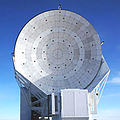 極地科學家、美國政府機關領導人,和對南北極研究有興趣的政治人物,26日參與位於華盛頓國家科學院所舉辦的2007-2008極地年開幕儀式。同時在南極,美國的大型天文望遠鏡表演了一場處女秀。
極地科學家、美國政府機關領導人,和對南北極研究有興趣的政治人物,26日參與位於華盛頓國家科學院所舉辦的2007-2008極地年開幕儀式。同時在南極,美國的大型天文望遠鏡表演了一場處女秀。
國際極地年,簡稱IPY,將研究重心放在增進人類對於極地如何影響全球氣候的了解,這是50年來國際間科學家大規模合作研究得來的結果。 IPY牽涉到60幾個國家及上千名科學家,是結合科學家的國際會議及世界氣象組織的計劃。
從2007年3月1日起至2009年3月9日,科學家將帶領超過200名物理、生物及社會學家,共同合作南北極的研究。雖然名稱為國際極地年,但此研究將跨越2個完整的年週期,為了確保對南極和北極全面及同樣多的研究。
為了正式啟動美國IPY,在南極的科學家2月16日將一座巨大的望遠鏡瞄準木星,興奮地蒐集這架儀器的第一筆觀測資料,同時也是這座望遠鏡的處女秀。
芝加哥大學天文及天文物理研究所教授卡爾斯特羅(John Carlstrom)指出:「南極天文望遠鏡的處女秀是此計劃的重要里程碑,也是南極站這個豐碩成果夏天的最佳結果。我們現在可以賦予儀器使命,開啟宇宙研究的未來。」由9個機構組成的研究團隊將使用此儀器,來解開當代宇宙及大自然的奧祕。
Polar scientists, the heads of U.S. government agencies, and politicians with an interest in Arctic and Antarctic research today took part in the opening ceremony for the International Polar Year 2007-2008 at the National Academies of Science in Washington. And at the South Pole, a giant U.S. telescope saw first light.
The International Polar Year, IPY, focused on advancing human understanding of how the Earth's polar regions impact global climate systems, is the largest internationally coordinated scientific research effort in 50 years. Involving thousands of scientists from over 60 countries, IPY is a program of the International Council for Science and the World Meteorological Organization.
From March 1, 2007 to March 9, 2009, scientists will conduct more than 200 physical, biological and social sciences research studies in the Arctic and Antarctic. While it is known as the International Polar Year, the research effort will span two full annual cycles in order to ensure full and equal coverage of both the Arctic and the Antarctic.
To kick off the U.S. IPY effort, scientists at the South Pole February 16 aimed an enormous new telescope at Jupiter and with great excitement collected the instrument's first test observations - known as the telescope's first light.
"SPT's first light is a major milestone for the project and a fitting conclusion to a remarkably productive summer at the South Pole station. We now look forward to fully characterizing the instrument and beginning cosmological observations," said John Carlstrom, the S. Chandrasekhar distinguished service professor in astronomy and astrophysics at the University of Chicago. A team of researchers from nine institutions will use the scope to unravel the fundamental mysteries of modern cosmology and the nature of the universe.




